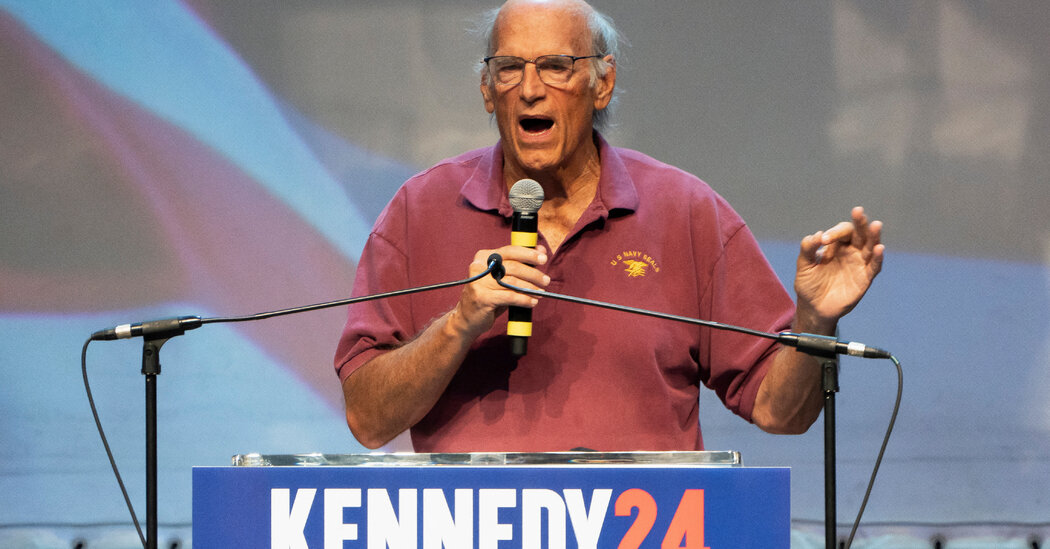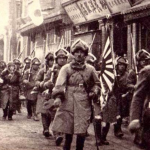

When Jesse “The Body” Ventura faced off against Hulk Hogan in the 1980s, Mr. Ventura played the heel — the caped villain whose staged cheap shots and provocations rallied the audience to the side of the mustachioed hero, glistening triumphantly in his underwear.
Mr. Ventura, now 73, is once again circling the ring.
In a subplot that seems far-fetched even by the standards of the 2024 presidential election, Mr. Ventura — an avowed political independent, former Minnesota governor and marijuana entrepreneur who was on the shortlist to be Robert F. Kennedy Jr.’s running mate — has in recent days endorsed the Democrats Kamala Harris and Tim Walz, sharply criticized the Republican ticket and touched upon a decades-old beef with Hogan over a failed effort to unionize pro wrestlers.
After Hogan — whose real name is Terry G. Bollea — made a popeyed, shirt-ripping appearance last month at the Republican National Convention, some have wondered if Mr. Ventura would appear in Chicago for the Democrats next week, scale the ropes in his feather boa and body-slam his rival, metaphorically, of course.
The answer is no. “I haven’t even been invited, and I don’t expect to be involved,” Mr. Ventura said in a telephone interview Wednesday from his home in Minneapolis.
And, frankly, the wrestling jokes are starting to bug him. “Why would they lump me in with Hulk Hogan?” Between six years in the Navy, a mayoralty and a governorship, Mr. Ventura noted, he has spent about as much time in public service as he did in professional wrestling.
“Hulk Hogan, he’s like Donald Trump,” Mr. Ventura continued. “He never did one day serving his country.” So, maybe no boa, but definitely fighting words.
To understand how this moment arrived — the raucous union of Minnesota politics, organized labor and 1980s machismo — it helps to revisit Mr. Ventura’s and Mr. Bollea’s career trajectories, and the unlikely way they have intersected with American politics.
Mr. Bollea, 70, was perhaps the biggest star of the World Wrestling Federation (now World Wrestling Entertainment), parlaying it into a career in entertainment and reality television.
His contact with the political world has been more indirect. Peter Thiel — the billionaire entrepreneur who in 2016 was one of former President Donald J. Trump’s top donors, and who retains influence in Mr. Trump’s orbit — helped bankroll a legal fight that Mr. Bollea waged against the news company Gawker Media after Gawker published a video of him having sex with the wife of a radio host.
In 2016, Mr. Bollea won at trial, and a Florida jury ordered Gawker to pay him $140 million. The case dealt a death blow to the media company.
In his convention speech last month, Mr. Bollea said he tried to “stay out of politics,” but said he felt compelled to support Mr. Trump, whom he described as “my hero.”
Mr. Trump and Mr. Bollea have known each other for decades, and the former president has close, longstanding ties to W.W.E. — in 2013, he was inducted into its Hall of Fame.
Mr. Ventura’s relationship with W.W.E. is more complicated. One day in 1986, in the weeks before the pay-per-view event “WrestleMania 2,” Mr. Ventura tried to rally his fellow wrestlers, in the privacy of the locker room, to form a union.
As Mr. Ventura recounted in 2016 on the podcast of a fellow former wrestler, “Stone Cold” Steve Austin, it wasn’t until the early 1990s, in the course of a lawsuit over royalties, that he learned Mr. Bollea had “ratted” him out to W.W. E. management. “It was like someone punched me in the face,” Mr. Ventura said. “This was my friend.”
Mr. Ventura referred to the conflict in an interview last weekend on MSNBC. “It was Hulk Hogan who cut my legs out from under me,” he said. “So it doesn’t surprise me to see Hogan with the Republicans. Hogan is as anti-union as you can get.”
A representative for Mr. Bollea did not provide comment.
After leaving wrestling, Mr. Ventura started a political career in his home state. In 1998, as the Reform Party candidate, he was elected governor of Minnesota, a stunning third-party victory that evinced the state’s appetite for political mavericks who could deliver unfiltered points of view.
(The New York Times quoted none other than Mr. Bollea in an analysis of that election: “Jesse’s victory proves that people want a real man in power to lead, not a play plastic puppet like other politicians,” Mr. Bollea said, adding that he’d “love to get him in the ring one time before he becomes president.”)
In 2000, Mr. Ventura quit the Reform Party amid turmoil over an arriviste candidate who had sought the party nomination for the presidential election. That candidate was Mr. Trump — his candidacy was opposed by the Reform Party founder Ross Perot but backed by Mr. Ventura.
Mr. Ventura has since become a critic of Mr. Trump. He was appalled by the Capitol riot on Jan. 6, 2021. “We all know guys like him,” Mr. Ventura said. “He will start a fight, then hold your coat.”
After one term as governor, Mr. Ventura left office in 2003 and became a media rabble-rouser and a prominent figure in independent and third-party politics. These days, he can be found writing on the Substack he shares with his son; he also started a marijuana business, Ventura Farms.
Earlier this year, The Times reported that Mr. Kennedy was considering Mr. Ventura as a possible running mate in his independent presidential campaign. Mr. Ventura had spoken at a recent Kennedy rally, and the two men had been in regular contact.
In the end, it was another vice-presidential pick that brought Mr. Ventura back into the spotlight: his friend from Minnesota, Mr. Walz.
In 2018, when Mr. Walz was first elected governor of Minnesota, he immediately called Mr. Ventura and arranged a meeting, Mr. Ventura has said. It made a profound impression on him.
“He wanted to pick my brain for over two hours,” Mr. Ventura said in the Times interview on Wednesday. “It shows me Governor Walz will reach across the aisle to be successful.”
Last year, when Mr. Walz signed a bill legalizing adult-use marijuana in the state, he invited Mr. Ventura to the signing.
Mr. Ventura still hates the two-party system. He came off the sidelines not only because of his respect for Mr. Walz, but because of the stakes. “To me, this election is too important,” he said, adding, “I want to see a woman president, in my lifetime.”
The post Hulk Hogan, Jesse Ventura and a Complicated Subplot to the 2024 Race appeared first on New York Times.


